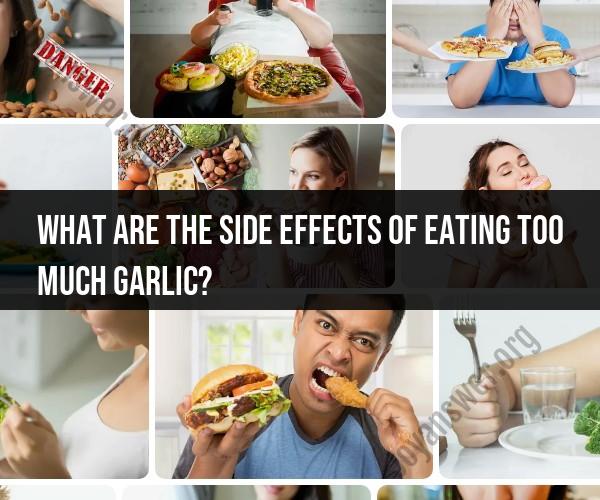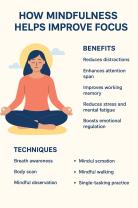What are the side effects of eating too much garlic?
While garlic is a popular and nutritious ingredient in many cuisines, excessive consumption of garlic, whether in raw or cooked form, or as supplements, can lead to various side effects and health concerns. Here are some potential side effects and precautions associated with eating too much garlic:
Digestive Disturbances:
- Eating excessive amounts of garlic can lead to digestive issues such as bloating, gas, diarrhea, and abdominal discomfort. These symptoms are more likely to occur when garlic is consumed in large quantities.
Bad Breath and Body Odor:
- Garlic contains sulfur compounds that can contribute to strong and persistent bad breath (halitosis) as well as body odor. These odors can be noticeable even hours after consuming garlic.
Heartburn and Acid Reflux:
- Garlic can relax the lower esophageal sphincter (LES), a muscle that normally prevents stomach acid from flowing back into the esophagus. This relaxation can lead to heartburn and acid reflux in some individuals, especially when garlic is consumed in large amounts.
Allergic Reactions:
- Some individuals may be allergic to garlic, and consuming excessive amounts can trigger allergic reactions. Symptoms can range from mild skin rashes to more severe reactions such as difficulty breathing or anaphylaxis in rare cases.
Bleeding and Blood Clotting:
- Garlic is known to have anticoagulant properties, which can affect blood clotting. Consuming very large amounts of garlic, especially in supplement form, may increase the risk of bleeding or interfere with medications that affect blood clotting.
Gastrointestinal Irritation:
- Excessive garlic consumption can irritate the gastrointestinal tract, potentially leading to gastritis or other digestive issues.
Medication Interactions:
- Garlic supplements, in particular, may interact with certain medications, such as blood-thinners and medications for blood pressure or diabetes. If you take medications regularly, consult your healthcare provider before using garlic supplements.
Skin Irritation:
- Handling raw garlic can sometimes cause skin irritation or allergic reactions in sensitive individuals.
Low Blood Pressure:
- Garlic has the potential to lower blood pressure. While this can be beneficial for some people, those with already low blood pressure should be cautious about excessive garlic consumption, as it may lead to hypotension.
It's important to emphasize that moderate consumption of garlic as part of a balanced diet is generally considered safe and even beneficial for health due to its potential cardiovascular and immune system benefits. However, if you have concerns about garlic consumption, especially if you are prone to any of the side effects mentioned above, it's advisable to consult with a healthcare professional for personalized guidance. They can help you incorporate garlic into your diet in a way that is both enjoyable and suitable for your specific health needs.
Garlic Overconsumption: Potential Side Effects and Health Risks
Garlic is a popular herb with a variety of health benefits, but it is important to note that consuming too much garlic can have negative side effects.
Here are some potential side effects and health risks associated with garlic overconsumption:
- Bad breath and body odor: Garlic contains compounds that can break down into gases that are released through the breath and skin, causing bad breath and body odor.
- Heartburn and indigestion: Garlic can irritate the lining of the stomach and esophagus, leading to heartburn and indigestion.
- Diarrhea and vomiting: Garlic can cause diarrhea and vomiting, especially in people with sensitive stomachs.
- Bleeding: Garlic can thin the blood, which may increase the risk of bleeding.
- Allergic reactions: Some people may be allergic to garlic, experiencing symptoms such as hives, itching, swelling, and difficulty breathing.
In rare cases, garlic overconsumption can lead to more serious health problems, such as liver damage and seizures.
Balancing Garlic Intake: Avoiding Excessive Consumption
The recommended daily intake of garlic for adults is 4,000 milligrams (mg). However, it is important to note that this is just a general guideline. Some people may be able to tolerate more garlic, while others may be more sensitive to its effects.
If you are experiencing any of the side effects listed above, it is important to reduce your garlic intake. You may also want to talk to your doctor to see if garlic is safe for you to consume.
Here are some tips for balancing your garlic intake:
- Eat garlic in moderation. Avoid eating more than 4,000 mg of garlic per day.
- Be aware of the different forms of garlic. Garlic can be consumed fresh, cooked, powdered, or in capsule form. Different forms of garlic may have different levels of potency.
- Avoid garlic if you have a sensitive stomach. If you experience heartburn, indigestion, or other digestive problems after eating garlic, it is best to avoid it.
- Talk to your doctor if you have any concerns. If you are taking any medications, or if you have any health conditions, talk to your doctor before consuming garlic.
Monitoring Your Diet: Recognizing Signs of Garlic Overindulgence
Here are some signs and symptoms that you may be consuming too much garlic:
- Bad breath and body odor: If you notice that your breath or body odor smells like garlic, even after brushing your teeth and bathing, it may be a sign that you are consuming too much garlic.
- Heartburn and indigestion: If you experience heartburn or indigestion after eating garlic, it may be a sign that you are consuming too much garlic.
- Diarrhea and vomiting: If you experience diarrhea or vomiting after eating garlic, it may be a sign that you are consuming too much garlic.
- Bleeding: If you experience unusual bleeding, such as nosebleeds or bleeding gums, it may be a sign that you are consuming too much garlic.
- Allergic reactions: If you experience any signs of an allergic reaction, such as hives, itching, swelling, or difficulty breathing, after eating garlic, it is important to seek medical attention immediately.
If you experience any of these signs or symptoms, it is important to reduce your garlic intake or stop consuming garlic altogether. You may also want to talk to your doctor to see if garlic is safe for you to consume.












